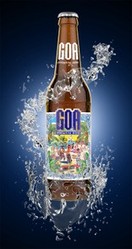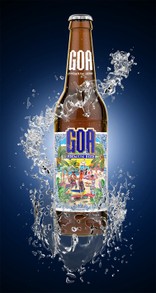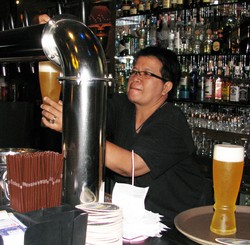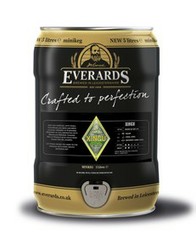There is a new choice appearing on the drinks menu of Indian restaurants in the UK – Goa Premium Beer, an Indian brewed lager that is also gluten free. The company is hoping that it can challenge the established brands by offering a choice for those on gluten-free diets. Here, three tasters give their verdict.

Goa Premium Beer: Lager hopes to cash in on gluten-free market
The latest gluten-free product to hit the market is an Indian beer called Goa Premium Beer, but is it any good?
For health reasons, some people are switching to a gluten-free diet, which can be varied in that it includes the likes of meat, fish, fruit, vegetables, potatoes and so on. However, its presence in the likes of wheat, barley and rye has meant that most beers fail the gluten-free test. This has led to a number of breweries producing gluten-free versions of some of their beers to meet market demand.
The latest company to jump on this bandwagon is Viiking Ventures. Last year, it acquired the Goa Kings beer brand from India’s Impala Distillery & Brewery, though Impala is still brewing the actual beer. This has now led it to launch in the UK a gluten-free beer called Goa Premium Beer, which it is targeting at the Indian restaurant market as an alternative for washing down the curries. Previously available across India and the United Arab Emirates, this is its first foray into a western market. Hoping for success, the company is already in discussions with distributors across Europe.
UK version
The version in the UK is slightly different to that sold in India. David Peters, operations coordinator at Viiking Ventures UK, explained the differences to me: “As a whole, we wanted to create a gluten-free beer which could cross over easily in to the health and wellness sector. Subsequently, this set us up well for entry in to the gluten-free rich market here in the UK. That said, the only difference between our version and that of our Indian counterpart is that we have reduced the sugar content in our UK beer and are using a longer maturation process of a minimum 21 days.”
The word “longer” is relative here. While some of the poorer lagers in the UK only mature for around a week, some of the better ones keep the maturation process going for around 40 days, and even longer for some of the stronger beers. Three weeks is thus not impressive.
The strength of the Goa beer is 4.8 per cent (alcohol by volume, or ABV) as the company didn’t want to position itself against the stronger lagers in the 5 to 8 per cent range.
Promotion
Marketing of the beer will be under the “Come Alive” theme embracing the hedonism of a beach party – the picture on the bottle is of a beach party. The packaging is inspired by the Portuguese azulejo art form of Arabic origin that is widely seen in Goan churches and homes in India.
“The healthy living agenda has been usurped by po-faced kill joys with their arbitrary five-a-day quotas and misinformation about fats and caffeine,” said Viiking Ventures director Frank Sequeira. “Here’s a gluten-free product which is fun.”
The company will also be focusing on the fact that Goa beer is actually brewed in India, whereas some of the so-called Indian brands found in Indian restaurants in the UK are actually brewed in the UK under licence.
Put to the test
Two of the 340ml bottles (the beer is also available in 650ml bottles and 500ml cans) of Goa Premium Beer were put the test by a panel of three beer enthusiasts, and the results were not encouraging. It has a light golden colour and an initial pilsner like taste, with a bit of a metallic hit and a hint of sweetness. There is no lasting finish, and it is quite gassy.
“It is hard to see how this will position itself against other mass market lagers,” said one taster. Another added: “It is very delicate. You wouldn’t taste this if you drank it with curry.” The third said: “This is an average pilsner, nothing special, you can hardly taste the hops.
Conclusion
While there is a growing market for gluten-free beers, a lot of the ones so far produced have been by craft brewers and also sell on taste. This beer fails on that, but that may not matter; it is targeting the Indian restaurant market where many just want something cool and alcoholic to wash down the curry.
It also has the backing of Viiking Ventures, part of JMJ Industries, a large conglomerate with various business verticals such as FMCG products, hospitality, entertainment, property, infrastructure, paper products and philanthropic activities. The company’s owner and founder is actor and film producer Sachiin Joshi.
If it can convince enough distributors to get it onto the menus of Indian restaurants, then it could be successful as a gluten-free alternative. However, it is such a shame that the company did not use this opportunity to bring a more tasty product into a restaurant market that sells on flavour.
You might also like
Full Moon Brewwork: A Microbrewery and Bar in Patong, Phuket, ...A look at the range of craft beers brewed at the Full Moon Brewwork microbrew...
What beers to drink while watching the 2014 Fifa World CupThe World Cup provides a good excuse to try beers from different countries wh...




 KZine Issue 31: Review of October 2021 Issueon 11/07/2021
KZine Issue 31: Review of October 2021 Issueon 11/07/2021
 KZine Issue 30: Review of June 2021 Issueon 07/05/2021
KZine Issue 30: Review of June 2021 Issueon 07/05/2021
 KZine Issue 29: Review of February 2021 Issueon 02/23/2021
KZine Issue 29: Review of February 2021 Issueon 02/23/2021
 KZine Issue 28: Review of September 2020 Issueon 10/01/2020
KZine Issue 28: Review of September 2020 Issueon 10/01/2020


Comments
SteveRogerson, Thank you for practical information, pretty pictures and product lines.
Does it happen on your side of the pond that a product may not have peanuts or wheat or other items high on typical allergy lists but that it's produced in a massive building where peanuts and wheat are processed?
Perhaps in regard to the gluten-free beer above, developers were thinking of something blander that would not be competitive with all the strong looks, smells, tastes and textures in Indian cuisine.